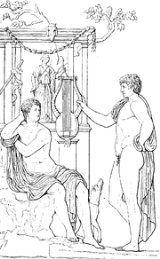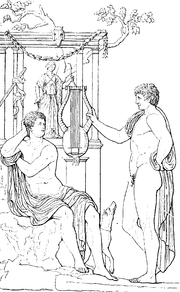
Amphion and Zethus
Encyclopedia

Greek mythology
Greek mythology is the body of myths and legends belonging to the ancient Greeks, concerning their gods and heroes, the nature of the world, and the origins and significance of their own cult and ritual practices. They were a part of religion in ancient Greece...
, were the twin sons of Zeus
Zeus
In the ancient Greek religion, Zeus was the "Father of Gods and men" who ruled the Olympians of Mount Olympus as a father ruled the family. He was the god of sky and thunder in Greek mythology. His Roman counterpart is Jupiter and his Etruscan counterpart is Tinia.Zeus was the child of Cronus...
by Antiope
Antiope (mother of Amphion)
In Greek mythology, Antiope was the name of the daughter of the Boeotian river god Asopus, according to Homer; in later sources she is called the daughter of the "nocturnal" king Nycteus of Thebes or, in the Cypria, of Lycurgus, but for Homer her site is purely Boeotian. Her beauty attracted Zeus,...
. They are important characters in one of the two founding myth
Founding myth
A national myth is an inspiring narrative or anecdote about a nation's past. Such myths often serve as an important national symbol and affirm a set of national values. A national myth may sometimes take the form of a national epic...
s of the city of Thebes
Ancient Thebes (Boeotia)
See Thebes, Greece for the modern city built on the ancient ruins.Ancient Thebes was a Boeotian city-state , situated to the north of the Cithaeron range, which divides Boeotia from Attica, and on the southern edge of the Boeotian plain...
, because they constructed the city's walls.
Childhood
Amphion and Zethus were the sons of AntiopeAntiope (mother of Amphion)
In Greek mythology, Antiope was the name of the daughter of the Boeotian river god Asopus, according to Homer; in later sources she is called the daughter of the "nocturnal" king Nycteus of Thebes or, in the Cypria, of Lycurgus, but for Homer her site is purely Boeotian. Her beauty attracted Zeus,...
, who fled in shame to Sicyon
Sicyon
Sikyon was an ancient Greek city situated in the northern Peloponnesus between Corinth and Achaea on the territory of the present-day prefecture of Corinthia...
after Zeus raped her, and married King Epopeus
Epopeus
Epopeus was a mythical Greek king of Sicyon, with an archaic bird-name that linked him to epops , the hoopoe, the "watcher"...
there. However, either Nycteus
Nycteus
In Greek mythology, Nycteus was a king of Thebes. His rule began after the death of Polydorus, and ended when he was succeeded by his brother Lycus.-Genealogy:...
or Lycus
Lycus (brother of Nycteus)
In Greek Mythology, Lycus was a ruler of the ancient city of Ancient Thebes . His rule was preceded by the regency of Nycteus, and he was succeeded by the twins Amphion and Zethus.-Genealogy:...
attacked Sicyon in order to carry her back to Thebes and punish her. On the way back, she gave birth to the twins and was forced to expose them on Mount Cithaeron. Lycus gave her to his wife, Dirce
Dirce
Dirce was the wife of Lycus in Greek mythology, and aunt to Antiope whom Zeus impregnated. Antiope fled in shame to King Epopeus of Sicyon, but was brought back by Lycus through force, giving birth to the twins Amphion and Zethus on the way...
, who treated her very cruelly for many years.
Antiope eventually escaped and found her sons living near Mount Cithaeron. After they were convinced that she was their mother, they killed Dirce by tying her to the horns of a bull, gathered an army, and conquered Thebes, becoming its joint rulers.
Rule of Thebes
Amphion became a great singer and musician after HermesHermes
Hermes is the great messenger of the gods in Greek mythology and a guide to the Underworld. Hermes was born on Mount Kyllini in Arcadia. An Olympian god, he is also the patron of boundaries and of the travelers who cross them, of shepherds and cowherds, of the cunning of thieves, of orators and...
taught him to play and gave him a golden lyre. Zethus became a hunter and herdsman, with a great interest in cattle breeding. They built the walls around the Cadmea
Cadmea
The Cadmea, or Cadmeia , was the citadel of ancient Thebes, Greece, named after the legendary founder of Thebes, Cadmus. The area is thought to have been settled since at least the early Bronze Age, although the history of settlement can only be reliably dated from the late Mycenaean period The...
, the citadel of Thebes. While Zethus struggled to carry his stones, Amphion played his lyre and his stones followed after him and gently glided into place.
Amphion married Niobe
Niobe
Niobe was a daughter of Tantalus and of either Dione, the most frequently cited, or of Eurythemista or Euryanassa, and she was the sister of Pelops and Broteas, all of whom figure in Greek mythology....
, the daughter of Tantalus
Tantalus
Tantalus was the ruler of an ancient western Anatolian city called either after his name, as "Tantalís", "the city of Tantalus", or as "Sipylus", in reference to Mount Sipylus, at the foot of which his city was located and whose ruins were reported to be still visible in the beginning of the...
, the Lydia
Lydia
Lydia was an Iron Age kingdom of western Asia Minor located generally east of ancient Ionia in the modern Turkish provinces of Manisa and inland İzmir. Its population spoke an Anatolian language known as Lydian....
n king. Because of this, he learned to play his lyre in the Lydian mode and added three strings to it. Zethus married Thebe, after whom the city of Thebes was named.
Later misfortunes
Amphion's wife Niobe had many children, but had become arrogant and because of this she insulted the goddess LetoLeto
In Greek mythology, Leto is a daughter of the Titans Coeus and Phoebe. The island of Kos is claimed as her birthplace. In the Olympian scheme, Zeus is the father of her twins, Apollo and Artemis, the Letoides, which Leto conceived after her hidden beauty accidentally caught the eyes of Zeus...
, who had only two children, Artemis
Artemis
Artemis was one of the most widely venerated of the Ancient Greek deities. Her Roman equivalent is Diana. Some scholars believe that the name and indeed the goddess herself was originally pre-Greek. Homer refers to her as Artemis Agrotera, Potnia Theron: "Artemis of the wildland, Mistress of Animals"...
and Apollo
Apollo
Apollo is one of the most important and complex of the Olympian deities in Greek and Roman mythology...
. Leto's children killed Niobe's children in retaliation (see Niobe
Niobe
Niobe was a daughter of Tantalus and of either Dione, the most frequently cited, or of Eurythemista or Euryanassa, and she was the sister of Pelops and Broteas, all of whom figure in Greek mythology....
). In Ovid
Ovid
Publius Ovidius Naso , known as Ovid in the English-speaking world, was a Roman poet who is best known as the author of the three major collections of erotic poetry: Heroides, Amores, and Ars Amatoria...
, Amphion commits suicide
Suicide
Suicide is the act of intentionally causing one's own death. Suicide is often committed out of despair or attributed to some underlying mental disorder, such as depression, bipolar disorder, schizophrenia, alcoholism, or drug abuse...
out of grief; according to Telesilla
Telesilla
Telesilla was a Greek poet, native of Argos, and was named one of the nine lyric muses.-History:According to the traditional story, when Cleomenes, king of Sparta, invaded the land of the Argives in 510 BC, and defeated and killed the men of Argos in battle, Telesilla, dressed in men's clothes,...
, Artemis and Apollo murder him along with his children. Hyginus
Gaius Julius Hyginus
Gaius Julius Hyginus was a Latin author, a pupil of the famous Cornelius Alexander Polyhistor, and a freedman of Caesar Augustus. He was by Augustus elected superintendent of the Palatine library according to Suetonius' De Grammaticis, 20...
, however, writes that in his madness he tried to attack the temple of Apollo, and was killed by the god's arrows.
Zethus had only one son, who died through a mistake of his mother Thebe, causing Zethus to kill himself. In the Odyssey
Odyssey
The Odyssey is one of two major ancient Greek epic poems attributed to Homer. It is, in part, a sequel to the Iliad, the other work ascribed to Homer. The poem is fundamental to the modern Western canon, and is the second—the Iliad being the first—extant work of Western literature...
, however, Zethus's wife is called a daughter of Pandareus
Pandareus
In Greek mythology, Pandareus was the son of Merops and a nymph. His residence was given as either Ephesus or Miletus. He was said to have been favored by Demeter, who conferred upon him the benefit of never suffering from indigestion, however much food he should eat...
in book 19, who killed her son Itylos in a fit of madness and became a nightingale.
After the deaths of Amphion and Zethus, Laius
Laius
In Greek mythology, King Laius, or Laios of Thebes was a divine hero and key personage in the Theban founding myth. Son of Labdacus, he was raised by the regent Lycus after the death of his father.-Abduction of Chrysippus:...
returned to Thebes and became king.
Compare with Castor and Polydeuces (the Dioscuri) of Greece, and with Romulus and Remus
Romulus and Remus
Romulus and Remus are Rome's twin founders in its traditional foundation myth, although the former is sometimes said to be the sole founder...
of Rome.

